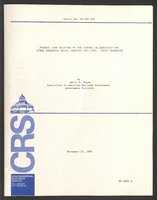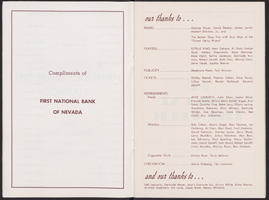Search the Special Collections and Archives Portal
Search Results

Meeting minutes for Consolidated Student Senate University of Nevada, Las Vegas, October 11, 1990
Date
Archival Collection
Description
Text

Nate Mack B'nai B'rith lodge no. 2825 Newsbeat newsletters, item 01
Description
Newsbeat newsletter for October 1990

Drug laws: reports, analysis, House Resolution 5484, status, correspondence, clippings, press release, statement from Senator Hecht, and notes
Date
Archival Collection
Description
Folder of documents from the Senator Chic Hecht Political Papers (MS-00003) -- Subject Files -- Judiciary file.
Text

Transcript of interview with Randy Lavigne by Stefani Evans and Clatyee D. White, August 23, 2016
Date
Archival Collection
Description
Randy Lavigne, Honorary AIA, has every reason to smile. Since 1995 she has been the Executive Director for AIA (American Institute of Architects) Las Vegas professional organization; she works daily with her daughter in a beautifully restored historic building in the heart of downtown Las Vegas; and the architects with whom she works so value her contributions they compiled and submitted documentation in order to surprise her with honorary AIA membership. In this interview, Lavigne recalls growing up in segregated Emory Gap, Tennessee, where her grandfather bought all the schoolchildren new shoes every year. She details the cross-country trip that brought her to Las Vegas in 1994 and eventually to the AIA in 1995. The bulk of the interview focuses on the building where the AIA is housed and the history of the organization. In 2008 the AIA moved from its former home at UNLV’s School of Architecture to the historic Fifth Street School in downtown Las Vegas. Lavigne discusses the history of the building and its significance to the City of Las Vegas. She reveals plans to examine the architectural history Las Vegas to celebrate the AIA Chapter’s sixtieth anniversary. She also talks about diversity in the profession, the process of licensure, publications, continuing education, organizational records, and the now-defunct auxiliary organization, the Architects' Wives League.
Text

Transcript of interview with Wilma and Burt Bass by Barbara Tabach, February 9 , 2015
Date
Archival Collection
Description
In 1939, Wilma (Frank) Bass was born in New York City, where she began her involvement in theater at the age of ten. Almost twenty years later, she met Burt Bass (1932- ) when both worked for a photography studio, one of Burt first post-high school jobs. Burt opened his first professional photography studio in 1962, shortly after he married Wilma in 1960. The couple soon had two daughters – Jill and Wendy – and moved to Las Vegas in 1974. Burt initially worked for his brother-in-law Ed Frank's check cashing businesses and later opened his own photography business, Burton Studio. He later added services such as fingerprinting, background checks, and photographs for identification cards. Wilma worked as a jewelry salesperson, first at the Gold Factory then at Nieman Marcus. Socially, she was very involved with Temple Beth Sholom’s Sisterhood, using her theater talents to write, direct and produce various shows for the Sisterhood, ORT as well as B’nai B’rith Youth Organization. In this interview, Burt discusses his photography business, the migration of its storefront around town, and his colorful landlords, including individuals like Moe Dalitz and Art Marshall. Wilma talks about her sales career in the local jewelry industry, and more extensively, she shares memories of her involvement in the Jewish community with theater productions. Much of the discussion revolved around related news articles and personal photos from their relationships and activities within the Jewish community. The couple also shares stories of friendships with local entertainers, including Jerry Lewis and Neil Sedaka.
Text

Transcript of interview with Morris "Moe" Dalitz by Brenda Baxter, November 4, 1977-March 30, 1978
Date
Description
Interview with Morris "Moe" Dalitz by Brenda Baxter, on several dates in late 1977 to early 1978. In this interview, Dalitz talks about his business and career endeavors before coming to Las Vegas, which included a laundry service and military service. Dalitz partnered with Wilbur Clark and became a successful hotel and casino owner in Las Vegas, as well as a real estate developer with properties including the Boulevard Mall and Sunrise Hospital.
Moe Dalitz was born in Boston in 1899, and soon after his family moved to Detroit, Michigan and where his father started a linen supply company. In 1930, during Prohibition, Moe moved to Cleveland, Ohio and he became involved with the then-illegal liquor business. At the age of 41, Dalitz enlisted in the Army and was stationed at Governors Island. Moe was put in charge of laundries and dry cleaning because of his experience in the laundry business. He played an important role in creating mobile laundry units that were used in the front lines in North Africa. His ingenuity won him a non-combatant award for his "unusual interest, ingenuity and talents" applied during his service. At the end of war, Moe returned to Cleveland, where his partners were successfully carrying on their business. It was then that they decided to go into the casino-nightclub business, opening nightclubs in Ohio and Kentucky. A couple years later, Moe and his partners met Wilbur Clark and agreed to finance his inactive project in Las Vegas. Thus, in 1950, the Desert Inn Hotel and Casino opened, and Moe Dalitz ushered in a new era for the city. Moe and partners continued to elevate the sophistication of the Strip when they acquired the operating lease to, and later part ownership of, the Stardust Hotel and Casino. Moe was instrumental in bringing the French Lido de Paris show to the Stardust, which was considered the most spectacular nightclub show produced in Las Vegas at its time. In addition to his gaming industry ventures, Moe engaged in significant real estate development, along with partners Allard Roen, Merv Adelson and Irwin Molasky. Their projects included Sunrise Hospital, The Boulevard Mall and Las Vegas Country Club as well as La Costa Resort and Spa in California. At the time of the interview, Moe was involved with the construction of a downtown hotel and casino. Moe Dalitz was the recipient of the Humanitarian Award from the American Cancer Research Center, and supported the Variety Club and the Home of the Good Shepard, amongst other charities.
Text

Interview with William Gus Flangas, November 12, 2004
Date
Archival Collection
Description
Text

Interview with Harrie Fox Hess, March 5, 2005
Date
Archival Collection
Description
Text

Interview with Louis Francis Wouters, May 20, 2004
Date
Archival Collection
Description
Text

